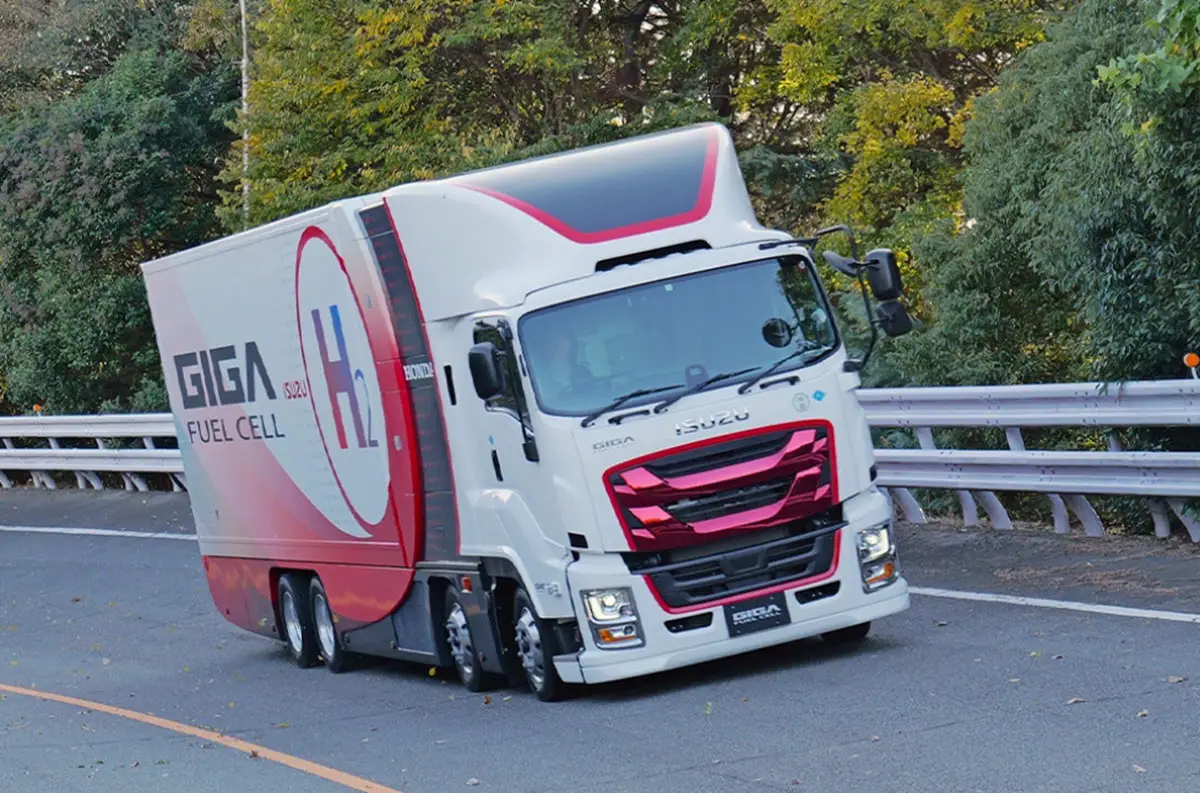
Honda, Isuzu, and GM: Pioneering Partnerships in Hydrogen Fuel Cell Technology Development
March 1, 2024Most recently, Honda revealed the 2025 Honda CR-V e:FCEV – America’s first production plug-in hydrogen fuel cell electric vehicle. This announcement is a testament to Honda’s dedication to leveraging clean energy sources and leading the way towards a carbon-neutral future.
Further, Honda has announced plans to expand the use of its fuel cell system beyond vehicles. The company is preparing a proof-of-concept Class 8 hydrogen fuel cell truck in the US and is also considering the application of its fuel cell system to construction equipment. This article explores these initiatives and Honda’s broader strategy for promoting carbon neutrality across various industries.
The Partnership between Honda and Isuzu
Japanese automotive powerhouses Honda Motor Co., Ltd. and Isuzu Motors Limited have teamed up to accelerate the development of fuel cell-powered heavy-duty trucks. This strategic partnership, announced in 2020, combines Honda’s innovative prowess in fuel cell technology and Isuzu’s expertise in heavy-duty truck manufacturing.
Their shared goal is to redefine the standard for heavy-duty trucks, meeting logistics demands while drastically reducing carbon emissions. The companies plan to launch the GIGA FUEL CELL, a zero-emission heavy-duty truck powered by fuel cells, by 2027.
The GIGA FUEL CELL Truck Features
The GIGA FUEL CELL truck is powered by four 103kW Honda solid polymer fuel cells. This impressive system provides ample power for the vehicle while maintaining its eco-friendly status. What sets the GIGA FUEL CELL truck apart is its ability to store 56kg of hydrogen, ensuring a substantial range for long-haul journeys
Further, the GIGA FUEL CELL truck is not just a conceptual model; it is a practical, heavy-duty truck designed to meet the rigorous demands of the logistics industry. With a 25-ton capacity, the truck is capable of handling significant payloads, making it an ideal solution for various commercial applications
The GIGA FUEL CELL truck was unveiled at the Japan Mobility Show in 2023. This event marked the first public exhibit of the vehicle, showcasing the progress Honda and Isuzu have made in their joint research project. The unveiling also demonstrated the potential of fuel cell technology in transforming the transportation sector.
The demonstration testing of a prototype model started on Japan’s public roads in December 2023 and is extended to September 2024. The plan was primarily focused in the Kanto region, encompassing Tochigi, Saitama, Tokyo and Kanagawa prefectures. Their goal is to debut the production model by 2027, leveraging the technological advancements, experience, and expertise gathered through their collaborative efforts. Simultaneously, Honda is pushing forward with its U.S. initiatives, developing a proof-of-concept Class 8 hydrogen fuel cell truck and actively engaging potential customers in discussions.
A Collective Effort For Honda’s Multi-Domain Hydrogen Strategy
Fuel Cell Electric Vehicles (FCEVs)
Honda is diversifying its portfolio with a focus on hydrogen technology, as part of its multi-faceted approach to sustainable transportation. The company’s recent unveiling of the 2025 Honda CR-V e:FCEV – its second private passenger car powered by hydrogen – exemplifies this strategic direction. This vehicle stands out for its unique combination of plug-in hybrid and hydrogen fuel cell technologies, underscoring Honda’s innovative commitment to clean energy solutions.
Commercial Vehicles
Setting their sights high in the commercial trucking industry as well as the construction vehicle market by applying it’s fuel cell system to construction equipment like excavators and wheel loaders, demonstrating their commitment to carbon neutrality and sustainable practices across various industries.
Sustainable Backup Power Solutions
The Torrance-based fuel cell station is a demonstration of the clean and uninterrupted power supply capabilities of hydrogen, particularly when paired with “green hydrogen” derived from renewable sources, effectively emitting only water vapor. These innovations mark a significant leap forward in providing high-quality, clean power generation.
The station uses modules equipped with four fuel cell systems each, laying the groundwork for mini hydrogen fuel cell plants in the future. Each module has a capacity of approximately 500 kW. The design allows flexibility in arranging the fuel cell units to fit various installation environments, accommodating cubic, L-shaped, or Z-shaped layouts. This project is a result of collaborative development with General Motors.
Over the last few years, the power requirements of data centers have been growing rapidly due to the expansion of cloud computing and big data utilization, and the need for backup power sources has been increasing from the perspective of business continuity planning (BCP). The Torrance fuel cell station also serves as a proof of concept for future commercialization of the power generation unit.
Advanced Research and Development
Honda has been at the forefront of hydrogen technology research and development, consistently pushing the boundaries of what’s possible in this domain. Looking beyond Earth, Honda envisions the use of their hydrogen technologies in outer space. Although still in the conceptual stage, this potential application represents an exciting frontier for hydrogen technology. It could provide a sustainable energy solution for future space missions, contributing to the broader goal of space exploration.
More Industry Collaboration for Advancing Technology
Honda and General Motors (GM) have initiated production at their jointly-owned facility, FCSM, marking it as the first large-scale venture for manufacturing fuel cells. The partnership aims to reduce costs by optimizing economies of scale, enhancing cell design, simplifying auxiliary equipment, utilizing common sourcing, and lessening the use of costly precious metals. This has resulted in new fuel cell systems that cost two-thirds less than the 2019 Honda Clarity Fuel Cell system. Both GM and Honda believe hydrogen and fuel cell technology will play a critical role in meeting diverse zero-emission energy and mobility needs. FCSM, established in Michigan in 2017 with an $85 million joint investment, has already created 80 jobs.
The Road Ahead
Honda’s proactive approach, supported by collaborative industry giants like Isuzu and GM, suggests a clear vision for hydrogen’s place in our sustainable future. With commercial applications materializing and further R&D paving the way, their vision is set to transform the automotive and energy landscapes.



 HFN News is your leading source for fresh hydrogen and renewable energy updates. Amid the fast-paced growth of hydrogen companies, we provide top-notch news and insights about this exciting sector. Our coverage spans from hydrogen cars to global sustainable initiatives, and we highlight the latest in green jobs and developing hydrogen hubs. We invite you to share your local hydrogen news and explore today’s renewable energy job listings on our site. Thanks for choosing HFN News as your trusted guide to the hydrogen and renewable energy world!
HFN News is your leading source for fresh hydrogen and renewable energy updates. Amid the fast-paced growth of hydrogen companies, we provide top-notch news and insights about this exciting sector. Our coverage spans from hydrogen cars to global sustainable initiatives, and we highlight the latest in green jobs and developing hydrogen hubs. We invite you to share your local hydrogen news and explore today’s renewable energy job listings on our site. Thanks for choosing HFN News as your trusted guide to the hydrogen and renewable energy world!